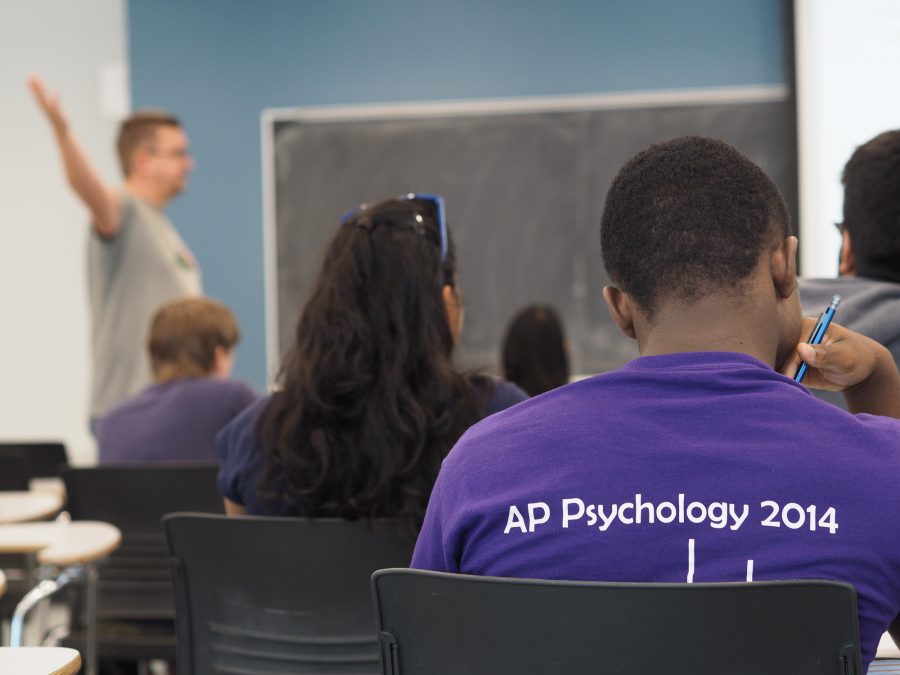“Modern” education on trial
Professor Scott Carney teaches students about innovation and engineering design in the ECE Building on campus. October 4, 2016.
Oct 19, 2016

When I pressed submit on my Lon-Capa quiz and finally took a breath and glanced upwards to the top corner of my computer screen, I realized I had spent three straight hours on the same three chemistry questions without moving.
I stayed at the library that night until 3:30 a.m. convincing myself I was getting ahead on my work.
A week and a half later, it was 1:30 a.m. and I was standing on Green street with my friend as we split ways to go home at the end of an “early” night at the library.
Like so many times before, she asked me how I was feeling with work, classes, clubs and more. I shook my head unable to come up with words to explain my thoughts. Then, I asked her if she had seen the recent video of a spoken word piece by Prince Ea circulating my Facebook timeline entitled, “I just sued the school system.”
Get The Daily Illini in your inbox!
The video is set up to appear like a court case with education on trial. It poses questions as to why there has not been more advancement and differentiation among the way most education takes place considering how much the world has changed. The term “educational malpractice” is used, creating a parallel between school and medical care.
“If a doctor prescribed the exact same medicine to all of his patients, the results would be tragic,” says Prince Ea.
A doctor must listen to each of his patients and do what is best for each one as an individual. However, that is not how our education works. With the common core and standardized tests, students are taught not to think for themselves and learn to problem solve, but to memorize facts and recite back the answers they are fed.
By assigning papers and projects instead, we have the opportunity to put in our own time and fit the pieces of our education together and expand on our thoughts.
I recognize the need for regulated education for children. There are basic requirements each person should learn, regardless of whether or not it is of high interest to them.
Exposure to the introductory levels of all subjects enables people to see what they like and what they do not like. That way, we go through our education becoming more aware of what we enjoy and what we are good at.
I see the value in challenging myself with subjects I know I struggle with, and I am not suggesting total freedom to choose which classes I do and do not attend. But at the same time, the requirement to take classes in subjects that will not have an impact on my future is causing much more damage than it is good.
As high school students preparing to go to college, the one thing we were told more than anything else was how liberating college would be to forge our own paths as individuals. We were told we would learn to live on our own, choose our friends and decide the course of our day-to-day lives. And while much of that has come true, the education portion of our lives is still very much assigned to us.
While students may choose which classes fill their gen-ed requirements, and there are electives that can be taken within our own major, a significant portion of our studies are still laid out in front of us when we start our degree just waiting to be checked off upon completion. And more than that, the classes still consist of sitting silently in giant lecture halls while a professor talks at us.
Then we go back to our apartments or dorm rooms and slowly make our way through the assigned homework, proving we understood what the teacher droned on about. Or, as may be the case more often than it should be, proving to ourselves that we can teach ourselves the material supposedly taught in class earlier, and then extrapolate from that how to do the homework.
Education is an amazing resource, one that should be respected and valued. Students should not dread going to classes, and spending more time in a library than our own rooms should not be a frequent occurrence.
Change in how the education system works will not come overnight. It will require a significant amount of thought and trial and error from students, teachers, administrators and even legislation makers.
In the video, Prince Ea says, “If we can customize health care, cars and Facebook pages, then it is our duty to do the same for education.”
Fully customizable education may seem like an impossible task, but sticking to the status quo cannot be the only alternative.
Hayley is a sophomore in ACES.
[email protected]






